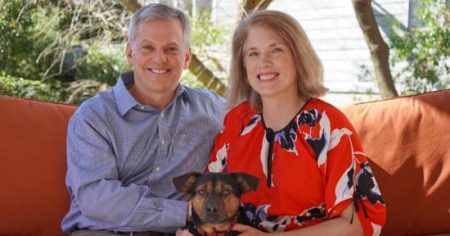Reggie Ealy – an Unconventional Man
 |
| Reggie Ealy |
by Moe White
Reggie Ealy is an unconventional man with an unconventional background, and therefore ideal for his job as Development Director for the acclaimed North Carolina Stage Company in downtown Asheville.
“Life is linear,” says Reggie. At each stage of his own life he has applied his talents and knowledge, and when opportunities arise he doesn’t hesitate to try something new, whether a place, a career, or a lifestyle. “What defines me is my work ethic and approach to life. My life is about mutual respect and mutual admiration. That’s the advice I would give to younger people: to lead by example.”
He grew up in Atlanta and studied Industrial Psychology at Belmont Abbey College near Charlotte for three-and-a-half years. Then, one semester short of graduation, he realized it wasn’t the right field for him, so he withdrew and moved first to Los Angeles (“I hated it.”) and then to New York.
After a few years as an art director for Macy’s, he decided on another
move, this time to Helsinki, Sweden. “I’d fallen in love with someone I
met on a train in Europe,” he says. So off he went. Helsinki. Then
Rovanieme, Finland, and Goteberg, Sweden. Finally Copenhagen, Denmark,
where for three years he studied the classic European performance style
of “Commédia del’arte,” including movement, clowning, acrobatics,
traditional Commédia characters, masks, and improvisation.
“Education is the key to success,” he says. “Education first and
foremost—and that means travel—which teaches you who you are, where you
come from. That’s how you find yourself.”
He has clearly found himself. “I don’t think of myself as African
American. I’m a black American—born and raised in America—black and
American. They call this country a melting pot, and it’s true: I don’t
know where my ancestors came from in Africa, and it doesn’t really
matter to me—my heritage is here.”
His friends reflect the breadth of his own travels. “My friends are from
Japan, Thailand, Finland, Sweden, South Africa, everywhere. I’ve always
wanted to find out where people are from,” says Reggie, who has been
all over the world learning about other people’s origins.
Reggie’s European adventure ended when he came home to Atlanta to help
his family while his grandfather was ill. His entrepreneurial spirit
wouldn’t let him rest, however, and he soon opened two popular
nightclubs in downtown Atlanta—the famous Yin Yang Café alternative jazz
club, and the Kaya Club & Bistro on Peachtree Street.
Like many an entrepreneur, though, Reggie encountered a smash-up. He
sold his successful night clubs to develop a large entertainment
complex—and the project cost him everything he had. So he started over.
 He waited tables for a friend, then went to work for the Historic
He waited tables for a friend, then went to work for the Historic
District Development Corporation, a community-based, nonprofit
organization whose mission is “to facilitate the preservation and
revitalization of the Martin Luther King, Jr. National Historic District
and other historic/preservation communities.” In that job he honed his
fundraising skills, eventually raising eight million dollars for the
development project.
Next Reggie went to South Africa, where he did urban planning and raised
funds for the Johannesberg World Cup. For the next year and a half he
lived comfortably among the white Afrikaners who were his friends—while
black squatters living nearby resented him as an outsider who was taking
jobs that should have been theirs. “I’ve never really felt afraid,
wherever I’ve gone, but there was tension there. I saw people having
fights, getting shot in public, and it occurred to me that something
could happen to me.”
After 18 months, Reggie came home for a vacation to visit his family.
But in short succession both his mother and grandmother suffered
strokes, so once again he put his life on hold, staying almost a year to
deal with their illness. And that brought him to Asheville.
“I had been to Asheville a lot; I had friends from college who came from
Asheville, so I came to visit them while I was in Atlanta. It was only
about a three-hour drive if I needed to see my mother and
grandmother—instead of three days to get home from South Africa if
anything happened. But I didn’t want to be in Atlanta, so I decided to
move here. I saw my friends, I walked around town, and one of my friends
mentioned the job at NC Stage.”
Reggie loves his job, and points out that it’s not just “the usual
suspects” like big corporations and foundations that support NC Stage.
“Even the unusual suspects are forking over the money,” he laughs.
“Small business owners are involved, like Izzy’s Coffee Den, the Rankin
Vault cocktail lounge, Minx Clothing Boutique, Bouchon; they’re helping
keep theater affordable by underwriting the ‘pay-what-you-will’
Wednesday performances.
He notes that The Chocolate Fetish is the theater’s ticket sponsor for
the season, and Bloomin’ Art, BMW of Asheville, Mellow Mushroom, Over
Easy Café are all underwriters. “Their clients, even their employees,
come to see shows,” notes Reggie. “These are working people, and they
now consider themselves theater-goers. And that’s what supports the
arts—young people, new audiences. What’s really wonderful is that even
in this difficult economic climate, NC Stage is really supported by
business community.”
One thing that Reggie does notice in Asheville is that “invisible lines
of segregation” exist here. He says, “I’m one of perhaps six people of
color doing things downtown, outside of Asians who own restaurants and
the flower shop, [and] Hispanics on construction sites. There are very
few people of color downtown. I walk down the street dressed for
business and smile and nod, and a lot of people look straight through
me.”
He notes that Asheville has a black mayor, but “Where’s the mayor at the
arts benefits? You don’t see her there, at fundraisers or auctions. How
can we have a black festival, and a whole bunch of white festivals, and
they don’t cross?” He acknowledges Asheville’s reputation as a diverse
place, “but it’s diversity in name only, there’s a difference between
what Asheville presents itself to be versus what it actually is. I
notice the dividing lines.”
Perhaps he notices them because he has eliminated his own. “I’m a black
professional, I’m also gay, Catholic, a clown, working in the arts. I
don’t define myself by any one thing. I just live my life and do my
thing accordingly. I try to offer mutual respect and mutual admiration.”
If we all had that attitude, imagine what our community could be!







